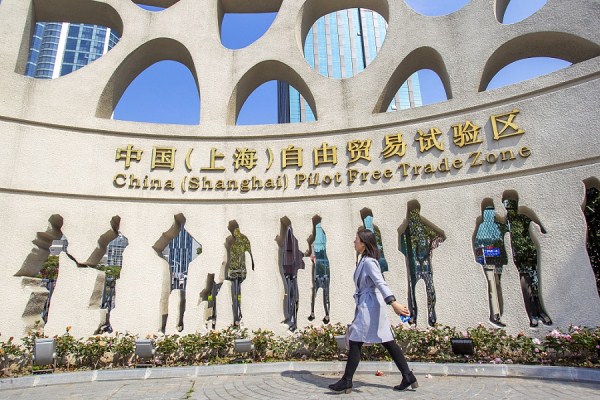Shanghai FTZ blazes new trail in institutional innovation

The China (Shanghai) Pilot Free Trade Zone, the first of its kind in the country, is spearheading the country's efforts in further opening-up and reform. [Photo/China Daily]
The China (Shanghai) Pilot Free Trade Zone, the first of its kind in the country, has become a pioneer in China's reform and opening-up with its efforts in institutional innovation.
To date, over 310 innovation and reform policies first implemented in the FTZ have been promoted in Shanghai and nationwide since its establishment in 2013.
Most of these focus on the national strategy and key industries, said Hang Yingwei, executive deputy director of Shanghai FTZ management committee.
"These institutional innovations have stimulated the vitality of market entities and enhanced the competitiveness of regional development," Hang said.
He added that in the past six years, the number of newly established enterprises in the Shanghai FTZ was 1.6 times that of 20 years ago -- thanks to the major breakthroughs in systematic innovations.
Meanwhile, the number of new foreign-invested enterprises has also increased from 5 percent of total enterprises, at the initial stage of the Shanghai FTZ, to around 20 percent today.
The FTZ's efforts in testing innovative policies have bolstered economic development in the Pudong New Area, which recorded a gross domestic product last year of over 1 trillion yuan ($145.4 billion) -- the first time the GDP had broken the key threshold.
Hang said Pudong will strive to break the threshold of 2 trillion yuan in its GDP within the next seven years, which requires more enterprises to participate in and promote institutional innovation.
Officials said Shanghai FTZ will launch more reforms and innovation projects in finance, modern services, and manufacturing industries.
They said this would facilitate better development of the offshore economy, entrepot trade, international asset management, cross-border e-commerce, cross-border research and development, as well as industrialization.
 Contact Us
Contact Us

 Pudong lights up city with spectacular shows and cultural marvels
Pudong lights up city with spectacular shows and cultural marvels Brilliant light show to illuminate Huangpu River
Brilliant light show to illuminate Huangpu River Maple leaves paint splendid scenery in Pudong
Maple leaves paint splendid scenery in Pudong Appreciate alluring lotus blossoms in Pudong's Century Park
Appreciate alluring lotus blossoms in Pudong's Century Park


